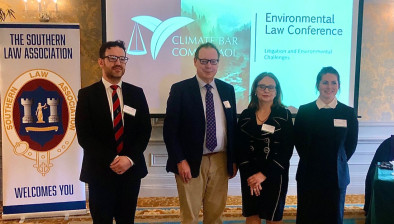NI High Court: Environmental campaigners fail in bid for unredacted documents and strike-out

Northern Ireland’s High Court has denied two interlocutory applications sought by environmental campaigners challenging the development of a gas storage facility at Islandmagee.

About this case:
- Citation:[2023] NIKB 41
- Judgment:
The first application was for a strike-out of various parts of the respondent’s evidence, and the second was for production of an unredacted version of a ministerial submission.
Background
In this application for judicial review, the applicants challenged the decision of the Minister for the Department of Agriculture, Environment and Rural Affairs (DAERA) to grant a Marine Construction Licence to Islandmagee Energy Limited for the development of a gas storage facility at Islandmagee.
The applicants were No Gas Caverns Ltd, a company formed by a group of local residents opposed to the development, and Friends of the Earth Ltd, a well-known campaigner on environmental issues. The application will proceed to a full hearing in May 2023, but here the applicants brought two interlocutory applications:
- To strike out parts of the respondent’s evidence, and
- For production of an unredacted version of a ministerial submission dated 31 March 2021.
The strike-out application
The applicants argued that three pieces of the respondent’s evidence ought to have been struck out for irrelevance.
(i) The CNCC issue
The first was an affidavit by Claire Vincent, principal scientific officer in DAERA, which stated that the Council for Nature Conservation and the Countryside (CNCC) was consulted but, in error, its response did not reach the Marine Licensing Team responsible for giving advice to the minister.
However, the affidavit argued that the issues raised by CNCC were raised by others and/or considered in any event as part of the determination process. These were the comments the applicants sought to strike out.
The court noted R (Weir) v Camden LBC [2005] EWHC 1875 (Admin) which considered the consequences of a failure to take into account a material consideration:
“The decision will normally have to be quashed if the defect, whatever it may be, may have affected the result. It is only if the court is satisfied that the result would not have been any different that normally it will be persuaded that no relief should be granted.”
The court found that it must therefore be permissible for a respondent to adduce evidence as to whether or not the proper consideration of a given representation would have made any difference to the outcome of a decision-making process.
The failure to take a material consideration into account does not automatically entitle an applicant to relief. The court therefore refused the application to strike out this part of the affidavit.
(ii) The scallop issue
Next, the affidavit discussed Ms Vincent’s recollection of discussions between officials of the impact of the project on scallop fishing, reaching the conclusion that there would be no significant detrimental effect on the scallop population.
The applicants contended that this was an example of an ex post facto comment being used to plug a vacuum in the evidence. The court rejected this as a mischaracterisation, finding that this was merely evidence of Ms Vincent’s own recollection of discussions, which could not be the subject of objection.
(iii) The Community Fund issue
Next, the applicants claimed that the respondent took into account an irrelevant consideration, namely the provision of a ‘community fund’, which was referenced in their Environmental Impact Assessment (EIA).
Ms Vincent claimed that text relating to the community fund was inserted into the EIA decision when it ought not to have been, and that no weight was given to the fund in the EIA decision or the decision to grant the Marine Licence.
The applicants argued that this claim was flatly contradicted by the evidence. The EIA decision stated that “There are other important areas for which mitigation measures are required” while going on to discuss that a “fund of £1m has been created by Islandmagee Energy Limited”.
The court found it ‘remarkable’ that a report which should focus on environmental information would contain extraneous and inappropriate material. However, the court also noted that the relevance or otherwise of these paragraphs could be determined at the ultimate hearing.
As such, the applicants’ strike-out application was dismissed.
The discovery application
One of the applicants’ grounds for judicial review involved a claim that the decisions under challenge ought to have been referred to the Executive Committee for determination on the basis that it was significant, controversial or cross-cutting.
Ms Vincent referred to advice given to the minister, which noted: “The decision does not cut across the statutory responsibility of another Department more than incidentally.” The applicants contended that these averments constituted a waiver of privilege on the part of the respondent.
Here, the court noted that in order for privilege to have been waived, there must be reliance on the advice as well as reference to it. As noted in PCP Capital Partners v Barclays Bank [2020] EWHC 1393 (Comm), “a purely narrative reference to the giving of legal advice does not constitute waiver”.
Ms Vincent’s affidavit referred to advice given to the minister by officials, but did not reference legal advice at all, or state that there was reliance on that advice. Therefore, privilege here was not waived.
The applicants next argued that privilege was waived following the disclosure of minutes of a meeting between officials from DAERA, the Utility Regulator, and the Department for the Economy. This disclosure stated: “Legal advice is that this is likely to be a cross-cutting issue.”
This was disclosed to a member of the public on foot of an Environmental Information Regulations request. The respondent stressed that no reliance was placed on this comment, and, in fact, legal advice had not been obtained on the issue at the time the meeting took place. This advice post-dated the meeting in question.
Here, again, the requirement for ‘reliance’ was absent, the respondent didn’t place the disclosure into evidence, let alone assert any reliance on its contents.
The judge determined that disclosure of the unredacted submission was not necessary for the fair disposal of these proceedings. The applicants’ application for disclosure of the unredacted submission and/or the legal advice provided was therefore dismissed.
Conclusion
Ultimately, the applicants’ applications for strike-out and for the delivery of the unredacted submission were dismissed.








